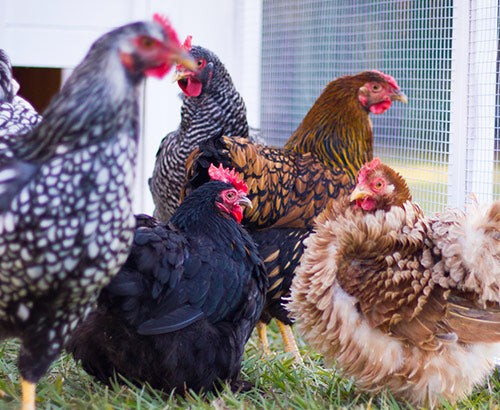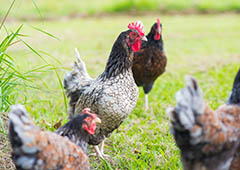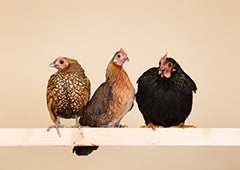Update: A special thanks to the team over at Silkie Chicken Experts who helped us write this article. If you love silkies, go check them out for incredible information.
With their pretty and profuse plumage, love of a snuggle, and their super sweet nature; silkies are one of our favourite breeds- what’s not to love? Whether you’re on the silkie bandwagon or not, by the end of this article we can assure you that you’ll have some lovely new silkie additions in your backyard flock quicker than we can say brilliant beautiful bantams!
Lifespan
A standard silkie chicken will generally live between 7-9 years, however this does all depend on the care given to them. Some Silkies have been known to live longer, so give them a little extra TLC and you’ll have their love for many years to come!

Class
The silkie is a feather-legged true bantam, meaning they are only available in bantam (miniature) size, and have profuse feathering covering their legs- a splendid sight indeed!
Rarity
They are a common breed, so getting your hands on one of these fabulous birds shouldn’t be a problem.
Origin
Originated in Southeast Asia- believed to be China.

History
These wonderful birds originated in China sometime before the 1200’s and were aptly named because of their unique plumage- which feels like silk to touch. Silkies claim to fame was being written about by Marco Polo in the 13th century, who wrote of ‘chickens with fur-like feathers’ in logs from his Asian travels. Silkies then made their way west, and were accepted into the North American Standard of Perfection in 1874. We are now lucky to find silkies all across the globe, and in many backyard flocks!
Fun Facts
-
Unlike other chickens who have white skin, silkies are known for their black or dark blue skin, strange-yes, but just another little quirk that makes this breed so unique!
-
Silkies have a natural maternal instinct and have been known to even sit on other birds eggs- ducks and turkeys included- a real Mother hen!
-
Chickens have an impressive UV cone in their eyes that allow them to see many more shades and colours than our eyes do- especially handy when it comes to foraging around in the grass for bugs and other tasty morsels! The silkie is already a fantastic Mum, but this UV cone allows her to determine the health of her littles ones- growing feathers will reflect UV light, and so she can see which of her chicks are growing well, and who she needs give a little extra TLC.
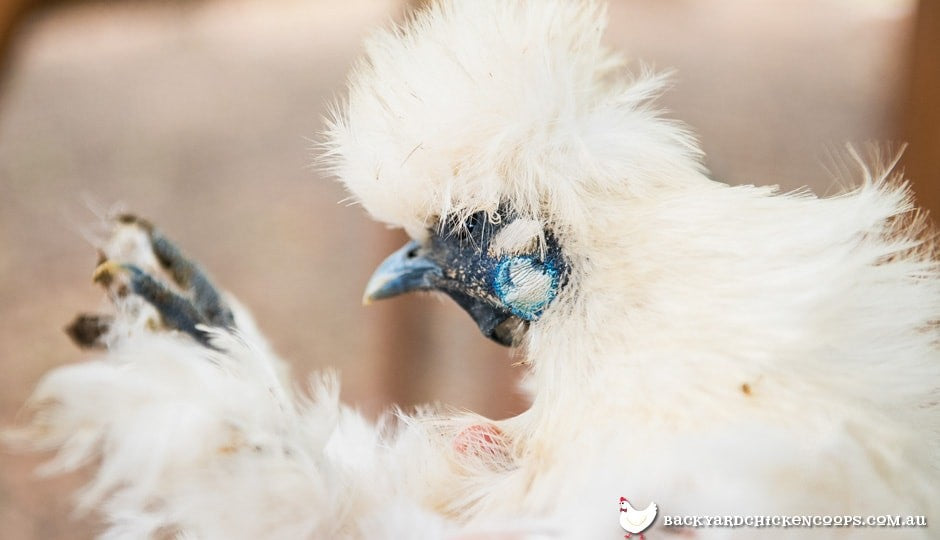
Current Use/Purpose
Silkie chickens are first and foremost an ornamental breed, kept in many suburban backyard flocks for the purpose of being a charming and sweet pet. Their striking appearance also makes them a popular exhibition bird (and a great aesthetic addition to your flock!). Many people also choose to keep silkies as they make such fantastic mothers, and will often sit on less maternal chickens eggs through to hatching- perfect if you’re wanting to breed lots of baby chickens for many years to come!
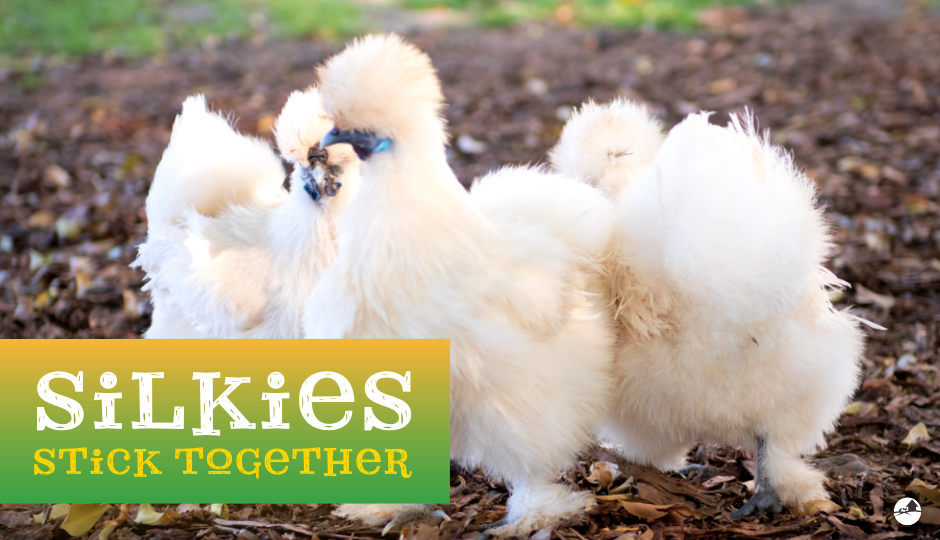
Personality & Temperament
Silkie chickens are one of the most charming and sweet natured breeds you will come across- we are yet to meet a silkie we haven’t fallen completely in love with! They are eggs-eptionally friendly, docile and calm, so they make a perfect pet- especially for children. They will happily sit in your little ones lap without hesitation, snuggling up close and lapping up all the love and attention. Unlike some chickens who get rather flighty around humans, silkies have poor flying skills and love human interaction, making handling (and hugging) them a breeze. Have neighbours in close proximity? Silkies are a very quiet breed, only piping up when they have proudly laid an egg or there is pending danger. They are known for being wonderful mothers and often adopt others as their own, which lends to their beautiful personality. There really is no fowl play when it comes to silkies!

Incubating & Hatching
As silkies are known for being quite broody hens and great mothers, many choose to forgo traditional incubation in favour of Mother Nature. Silkies will happily sit on her clutch of eggs until hatching day, and show great maternal instinct along the way- helping out her chicks where she can. However, as silkies do have a dense ‘under fluff’, it is sometimes the case that young chicks will become entangled in these feathers which can result in fatality.
If incubating yourself, ensure that you have a good quality incubator with an accurate humidity control, as this has been known to sometimes affect the hatchability of silkies, other than this, incubation should be no different to other breeds. When it comes to hatching, silkies may require a little extra attention and effort.They often have a thickened membrane in the shell, which when combined with their larger head and feet, can make the hatching process a little more difficult and delicate. If they seem to be struggling to make progress after pipping, you may want to intervene, helping the chick out as best you can without rushing or forcing the process more than you need to. However, this is not a common occurrence, and many silkies will take to hatching like champs!
Egg Behaviour
While silkies aren’t famed for their egg laying abilities, they are quite good and consistent layers, laying around 3 lovely little cream eggs a week. Their eggs might only be small, but don’t let that put you off- they are still as delicious and nutritious as ever! If you’re lucky, you will even have fresh eggs gracing your breakfast table throughout winter, as their fluffy feathers will often keep them warm, content and laying through the colder months.

Silkie Roosters
It's actually quite difficult to determine a Silkie's gender than many other breeds, this is especially the case in the chicken's early days.
A key difference between a silkie hen and a silkie rooster is size. Roosters are larger than hens and have larger, rounder wattles with larger combs. Silkie roosters also have unique feathers alongside the fuzzy ones. These longer, pointed, hard feathers are similar to those of other birds.

You may also notice crowing as a sign that your chook is a rooster, but that may not always be the case.
Appearance
The silkie is famous for it’s very unique and quite impressive appearance. It’s most striking feature of course is its fluffy silk-like plumage- so fluffy and fuzzy that they have been mistaken for bunnies! Silkies also have a number of very unique features that you will not find in many other chicken breeds, such as having five toes (as opposed to four), and dark blue or black flesh, bones and earlobes- what a fascinating breed indeed!

Silkies can be bearded or non-bearded, have a walnut comb and are also a crested bird, with the feathering surrounding their head often so profuse you can’t see their funny little faces. Their fantastic feathering also covers their legs, so it’s no wonder they often draw similarities to a giant pom-pom!
Recognised Variations: black, blue, buff, white, partridge, splash and gray.

Other Variations: red, lavender, porcelain and cuckoo.

Care
Silkies like all other chickens require a certain amount of care to keep them happy and healthy, and while they are not a high-maintenance breed, because of their delicate and substantial feathering, they do need a little extra attention to keep them looking super smart and sassy.
Grooming
To keep themselves looking super sharp, silkies will dust bath and preen themselves, so they don’t require much extra grooming. If indeed your fluffy friends do get themselves all muddy a simple rinse and pat dry will do the trick! However it is important to check them over regularly for lice, mites and other parasites- with extra feathers comes extra responsibility!
Diet
Silkies require no special diet; to keep them fighting fit be sure to feed them a balanced diet rich in protein and a healthy mix of seeds, grains and vegetation. When they are coming into point of lay, they should be fed a specialised ‘layer feed’ to ensure they get all the nutrients they need to produce a bounty of delicious eggs.
Housing
Just like all chickens, silkies require a good quality coop to protect them from the elements and pesky predators. It should be constructed from a sturdy timber, with a galvanised wire mesh and sturdy locks to keep out unwanted visitors. As they love to sit on their eggs quite often, the coop should have adequate nesting boxes that are lovely and spacious and in a draft-free area. Roosts are also an important feature of a silkies home sweet home, however it is best if they are not too high off the ground as silkies struggle in the flying department. Silkies are active little birds, and require some room to stretch their fantastically feathered legs, so be sure that their humble abode has a run, or fenced in area for them to explore.


Health Issues
Silkies are not known to develop other furthered health conditions other than what a normal chicken would. However, due to their fluffy plumage they are susceptible to mite and lice infestation, so it is important that they are checked over for parasites regularly. If parasites are present, be sure they are treated appropriately, either by yourself or a vet, as these infestations are known to spread and can cause serious health issues among your chickens. Dust bathing is also particularly important to help prevent lice, mites and fleas, so make sure you provide your flock with dust bathing amenities. Like with all chickens, also be sure to routinely worm your silkies, as this is another ailment that can spell disaster if not treated properly.
Hardiness
While silkies have the nature of sweet, docile little darlings, don’t be fooled, they are still considered quite a hardy and resilient breed! Their pretty plumage keeps them relatively insulated, so they are are able to thrive in both cold and warm climates. Do be aware though as silkies feathers are more like a fur and not waterproof like other chicken breeds, so they will need ample shelter and protection if you live in a more tropical climate. Being smaller and unable to fly, they do bear confinement well, however they will make great use of large spaces if given it, and are fantastic foragers- able to spot tasty morsels from afar!

Why We Love Them!
I think by now it is quite obvious that we absolutely adore silkies and believe they are a must have addition to every backyard flock! But if we must put it in writing, here are the top five reasons we are so taken with sensational silkies, and why you need to get them stat!
-
While we’re not one to judge a book by it’s cover, it’s hard to ignore the silkie in all it’s fluffy plumage glory! More exquisite looking than your regular cat or dog, the silkie sure is easy on the eye.
-
Don’t forget all it’s crazy cool chicken quirks- black blue flesh and appendages, five toes, feathered legs and beards- not your everyday red hen!
-
They love you back! Silkies adore human interaction and will dote on you- following your every move in the garden. They’re also quite partial to a cheeky chicken cuddle-who said chickens couldn’t be affectionate?!
-
They provide you with lots of lovely little eggs- and consistently too! They may not be as large as your ISA Brown’s eggs but they sure are just as delicious (and nutritious)- eggs-ellent for little mouths!
- With a personality that is as sweet as sugar, it’s hard not to fall in love with silkies! Possessing the appearance that they do, you would be forgiven for thinking that they are a high-maintenance bird, but these little darlings are anything but. Being so docile and calm means they are a delight to care for, and their friendly and gentle nature makes them a sensational pet!
Want to know more? Check out our 5 reasons to love Silkies here!
As well as the beloved silkies, there are so many brilliant breeds to consider when buying chickens. Deciding to become a chicken parent is the easy part. The hardest is deciding which breed is most suitable for you. It can be eggtremely confusing and difficult – so where should you begin?
Cluckily, our friends over at Chickenpedia have created an amazing Chicken Breeds Course. This extensive online course shares useful advice on choosing the right chickens for you as well as size & frequency of eggs laid. You’ll even learn about their individual personalities, and be able to use their family-friendly compatibility scale through this well-structured program. It really is a great way to find your perfect backyard buddies which is why I highly recommend them to all of my readers! The courses are beginner-friendly and filled with vital information to help you raise a happy, healthy flock.
As chicken keepers, we want to do an eggcellent job when caring for our feathered friends, but many of us struggle to handle chicken health or behavior issues, especially in the first few years of having a flock. Chickenpedia have a full range of comprehensive online courses that cover everything you didn’t know you need to know and then some more! From healthcare to raising baby chicks to feeding and behavior, that’ll give you the knowledge and confidence to successfully look after your chickens.
As a member, you will get access to ALL their fantastic courses. So, no need to wing it, become a confident chicken keeper. Click here to check out Chickenpedia today!





